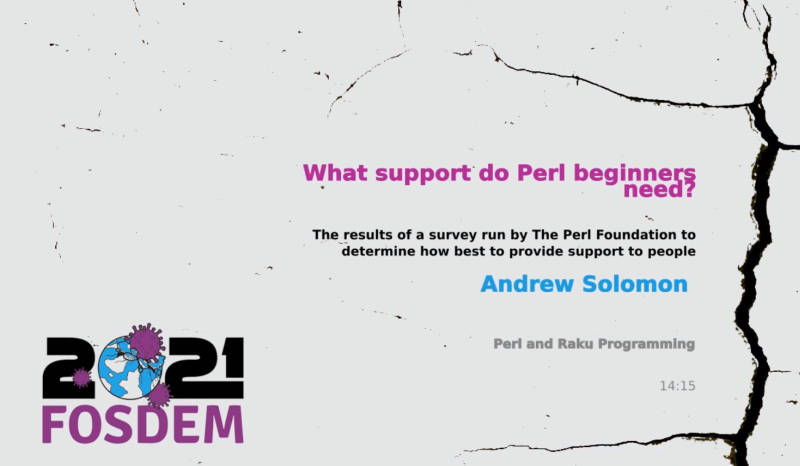| New To Perl? What Do You Need? The Results |
| Written by Nikos Vaggalis | |||
| Friday, 26 February 2021 | |||
|
The results and analysis of a recent survey into what help and guidance Perl beginners would find useful revealed that learning Perl can be a lifelong challenge and that more step-by-step tutorial might well help. As we reported in January, developers who use Perl were invited to take a survey to provide feedback on what help and guidance they would find useful. The survey was prepared by Andrew Solomon, founder of Geekuni which provides online Perl Training, and was sponsored by The Perl Foundation. Solomon took inspiration from the fact that many of his trainees were solo devs rather than belonging to a larger Perl group. While in the latter case there's an onboarding process, in the former there was none, and with no colleagues to ask when stuck, these developers find solving their problems hard by themselves. The question that arose then is "how do you support those people in their lone journey and how can the TPF help out?" In order to do that, Solomon had to first decipher how these devs perceive the notion of help. If you find that out, then you can also funnel your attempts on improving that process. The results are now in. Let's see what insight they provide. Out of the 415 participants that took the survey, 70% percent have been using Perl over 10 years but still consider themselves beginners and still find programming in Perl challenging. It seems Perl virtues of TIMTOWTDI, or “There is more than one way to do it” to spell it out for non-Perlistas, and the vast CPAN (Comprehensive Perl Archive Network) ecosystem are also its curses. We'll come back to that. The survey had the oxymoron result that the people who would make most use of proffered TPF were those with less than 2 years experience and those with 10+ years experience. Learning Perl is a lifelong struggle, it seems. The encouraging fact, though, was that after a long period of negativity and market devaluation, Perl is in the last couple of years watching its popularity rising with beginners adopting it. But let's meet those people, let's look into what they do. Most were pros but in second place there were people who were not there for the money but who chose Perl as a hobby. TPF should especially give a helping hand to the latter group to allow them to cultivate their passion, since they're the best representatives for spreading Perl's strengths in a word-of -mouth fashion. The groups of Sys admins and Devops engineers are also going strong.
Unsurprisingly, people who do not want much help, are those belonging to a supportive team of Perl programmers at work. It makes sense, as they can ask their colleagues when things get tough. Of the other group, that of the loners, we have to explore the ways they look for help. As all devs do, they first google for it. If they can't find it that way, they use discussion forums like Stackoverflow or Perlmonks. This looks standard procedure, but delving deeper into the actual responses revealed something else; that they don't go to those forums for asking questions but instead visit them with the intent of trying to find an answer to a question that they've formulated, but someone else has already asked. Thus, one immediate step that the TPF can take is improving SEO so that these Perl-related forums are more search engine friendly and therefore more easily available. Plus beef up the amount of questions and answers that these forums hold. The next fallback for help is looking for books, online courses and video, in that order, while last in preference came real-time chat and one-to-one contact. It seems that people are not even keen on asking questions in discussion forums. Could it be that people are closing in on themselves and exercising social distancing even when online, perhaps a sign of the times, or is it through fear that their questions might get characterized as stupid? The latter has to do with the toxicity that exists in the online communities at large, and one way that the TPF could approach this issue is to focus its resources not on developing better chat services, after all they're the least popular, but to something more tangible like exercising better governance and forum moderation. Going back to Perl's virtues and curses. TIMTOWTDI makes onboarding difficult as there's no standard way of doing things, something not good for someone trying to find his bearings. CPAN, on the other hand, with the vast amount of modules similar in functionality it offers, makes choosing the right one a difficult proposition too. What beginners would like is a standardized way of doing things, along the lines of a framework. They want OO, Web and Database functionality out of the box. Too much freedom is undesirable, at least in the beginning. Perl 7 looks like going that direction by standardizing the best practices and sensible defaults. On top of that, beginners also need the security and agility an IDE provides. Nowadays only a few hardcore devs use VIM for their programming; most use an IDE. Perl has Padre, which works but is not actively supported any more, and ActiveState's Komodo IDE, which recently began to be offered for free. The final takeaway was that people who learn on their own find step-by-step tutorials equivalent to watching a colleague writing code and building something. It's true that programming is a task that you learn by practicing. So a final way that TPF can help is by providing more step-by-step tutorials. These were the results of the survey. Now what's left is for the TPF to act on them. If you want to get involved, send an email to andrew@geekuni.com.
More Information Coding in Perl? What support do you need? FOSDEM-Andrew Solomon announces the results of the survey Related ArticlesNew To Perl? What Do You Need?
To be informed about new articles on I Programmer, sign up for our weekly newsletter, subscribe to the RSS feed and follow us on Twitter, Facebook or Linkedin.
Comments
or email your comment to: comments@i-programmer.info |
|||
| Last Updated ( Saturday, 27 February 2021 ) |




